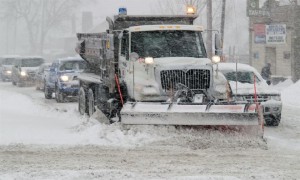 Winter weather in Northwest Missouri can range from very mild to very severe. It is important to prepare for winter weather prior to the begin of cold weather, and important to check your supplies often during the season to be sure they are still adequate for further severe weather events.
Winter weather in Northwest Missouri can range from very mild to very severe. It is important to prepare for winter weather prior to the begin of cold weather, and important to check your supplies often during the season to be sure they are still adequate for further severe weather events.
Before Winter Storms and Extreme Cold
Add the following supplies to your disaster supplies kit:
- Rock salt to melt ice on walkways
- Sand to improve traction
- Snow shovels and other snow removal equipment.
Prepare your home and family
- Prepare for possible isolation in your home by having sufficient heating fuel; regular fuel sources may be cut off. For example, store a good supply of dry, seasoned wood for your fireplace or wood-burning stove.
- Winterize your home to extend the life of your fuel supply by insulating walls and attics, caulking and weather-stripping doors and windows, and installing storm windows or covering windows with plastic.
- Winterize your house, barn, shed or any other structure that may provide shelter for your family, neighbors, livestock or equipment. Clear rain gutters; repair roof leaks and cut away tree branches that could fall on a house or other structure during a storm.
- Insulate pipes with insulation or newspapers and plastic and allow faucets to drip a little during cold weather to avoid freezing.
- Keep fire extinguishers on hand, and make sure everyone in your house knows how to use them. House fires pose an additional risk, as more people turn to alternate heating sources without taking the necessary safety precautions.
- Learn how to shut off water valves (in case a pipe bursts).
- Know ahead of time what you should do to help elderly or disabled friends, neighbors or employees.
- Never run a generator in your garage during a power outage. CO (Carbon Monoxide) can build to dangerous levels inside your home causing severe injury or death.
Prepare your car
Check or have a mechanic check the following items on your car:
- Antifreeze levels – ensure they are sufficient to avoid freezing.
- Battery and ignition system – should be in top condition and battery terminals should be clean.
- Brakes – check for wear and fluid levels.
- Exhaust system – check for leaks and crimped pipes andrepair or replace as necessary. Carbon monoxide is deadly and usually gives no warning.
- Fuel and air filters – replace and keep water out of the system by using additives and maintaining a full tank of gas.
- Heater and defroster – ensure they work properly.
- Lights and flashing hazard lights – check for serviceability.
- Oil – check for level and weight. Heavier oils congeal more at low temperatures and do not lubricate as well.
- Thermostat – ensure it works properly.
- Windshield wiper equipment – repair any problems and maintain proper washer fluid level.
- Install good winter tires. Make sure the tires have adequate tread. All-weather radials are usually adequate for most winter conditions. However, some jurisdictions require that to drive on their roads, vehicles must be equipped with chains or snow tires with studs.
- Maintain at least a half tank of gas during the winter season.
Place a winter emergency kit in each car that includes:
- Shovel
- Windshield scraper and small broom
- Flashlight
- Battery powered radio
- Extra batteries
- Water
- Snack food
- Matches
- Extra hats, socks and mittens
- First aid kit with pocket knife
- Necessary medications
- Blanket(s)
- Tow chain or rope
- Road salt and sand
- Booster cables
Dress for the Weather
- Wear several layers of loose fitting, lightweight, warm clothing rather than one layer of heavy clothing. The outer garments should be tightly woven and water repellent.
- Wear mittens, which are warmer than gloves.
- Wear a hat.
- Cover your mouth with a scarf to protect your lungs.
Maintain Good Situational Awareness
- Pay attention to the weather forecast during the winter months, and make travel and family plans accordingly
- Buy a weather radio, and program it to alert for your county. Keep fresh batteries in the radio so it works during power outages
- During winter weather, travel only if necessary.
- When traveling, let someone know when you will leave, when you will arrive, and what route you plan on taking.